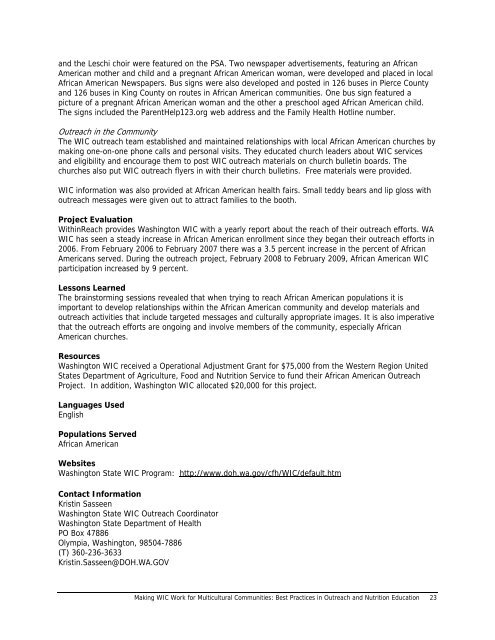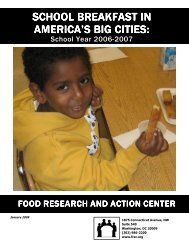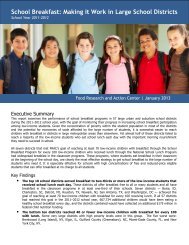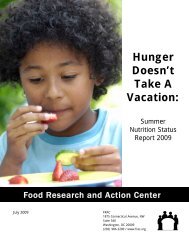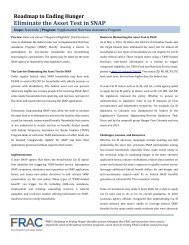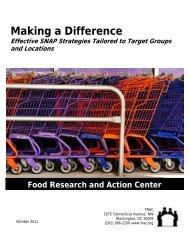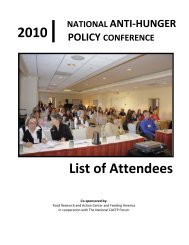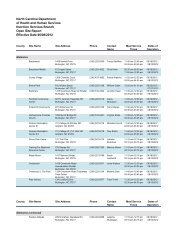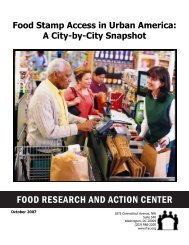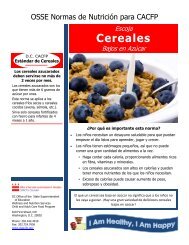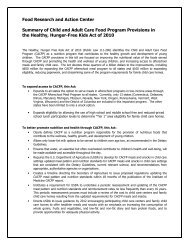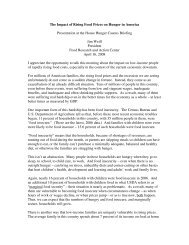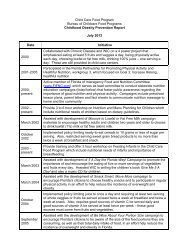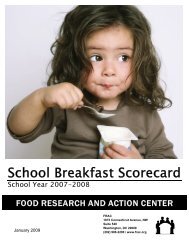Making WIC Work for Multicultural Communities - Food Research ...
Making WIC Work for Multicultural Communities - Food Research ...
Making WIC Work for Multicultural Communities - Food Research ...
You also want an ePaper? Increase the reach of your titles
YUMPU automatically turns print PDFs into web optimized ePapers that Google loves.
and the Leschi choir were featured on the PSA. Two newspaper advertisements, featuring an African<br />
American mother and child and a pregnant African American woman, were developed and placed in local<br />
African American Newspapers. Bus signs were also developed and posted in 126 buses in Pierce County<br />
and 126 buses in King County on routes in African American communities. One bus sign featured a<br />
picture of a pregnant African American woman and the other a preschool aged African American child.<br />
The signs included the ParentHelp123.org web address and the Family Health Hotline number.<br />
Outreach in the Community<br />
The <strong>WIC</strong> outreach team established and maintained relationships with local African American churches by<br />
making one-on-one phone calls and personal visits. They educated church leaders about <strong>WIC</strong> services<br />
and eligibility and encourage them to post <strong>WIC</strong> outreach materials on church bulletin boards. The<br />
churches also put <strong>WIC</strong> outreach flyers in with their church bulletins. Free materials were provided.<br />
<strong>WIC</strong> in<strong>for</strong>mation was also provided at African American health fairs. Small teddy bears and lip gloss with<br />
outreach messages were given out to attract families to the booth.<br />
Project Evaluation<br />
WithinReach provides Washington <strong>WIC</strong> with a yearly report about the reach of their outreach ef<strong>for</strong>ts. WA<br />
<strong>WIC</strong> has seen a steady increase in African American enrollment since they began their outreach ef<strong>for</strong>ts in<br />
2006. From February 2006 to February 2007 there was a 3.5 percent increase in the percent of African<br />
Americans served. During the outreach project, February 2008 to February 2009, African American <strong>WIC</strong><br />
participation increased by 9 percent.<br />
Lessons Learned<br />
The brainstorming sessions revealed that when trying to reach African American populations it is<br />
important to develop relationships within the African American community and develop materials and<br />
outreach activities that include targeted messages and culturally appropriate images. It is also imperative<br />
that the outreach ef<strong>for</strong>ts are ongoing and involve members of the community, especially African<br />
American churches.<br />
Resources<br />
Washington <strong>WIC</strong> received a Operational Adjustment Grant <strong>for</strong> $75,000 from the Western Region United<br />
States Department of Agriculture, <strong>Food</strong> and Nutrition Service to fund their African American Outreach<br />
Project. In addition, Washington <strong>WIC</strong> allocated $20,000 <strong>for</strong> this project.<br />
Languages Used<br />
English<br />
Populations Served<br />
African American<br />
Websites<br />
Washington State <strong>WIC</strong> Program: http://www.doh.wa.gov/cfh/<strong>WIC</strong>/default.htm<br />
Contact In<strong>for</strong>mation<br />
Kristin Sasseen<br />
Washington State <strong>WIC</strong> Outreach Coordinator<br />
Washington State Department of Health<br />
PO Box 47886<br />
Olympia, Washington, 98504-7886<br />
(T) 360-236-3633<br />
Kristin.Sasseen@DOH.WA.GOV<br />
<strong>Making</strong> <strong>WIC</strong> <strong>Work</strong> <strong>for</strong> <strong>Multicultural</strong> <strong>Communities</strong>: Best Practices in Outreach and Nutrition Education 23


